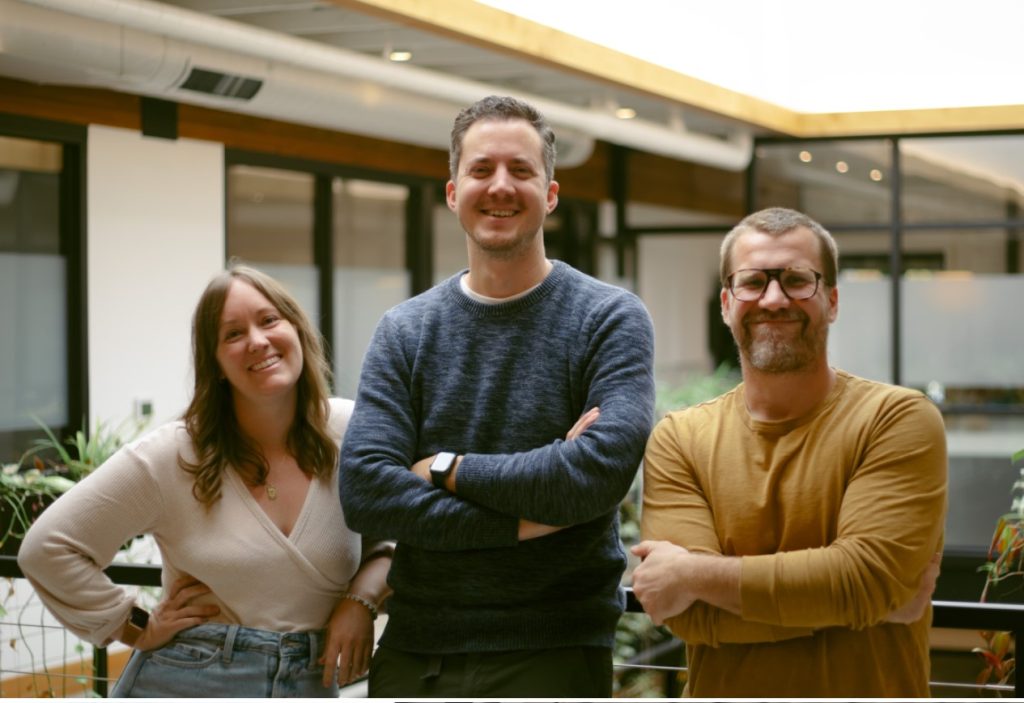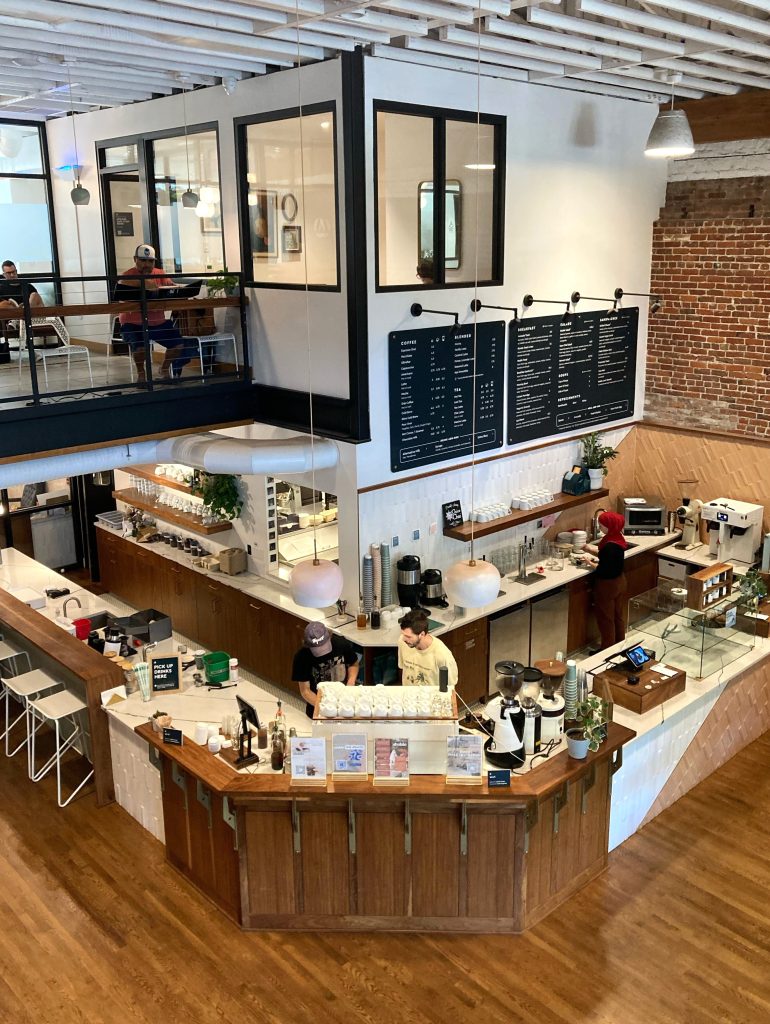
By Ken Magri
This place is serious about coffee, very serious.
But there is more to Stoble Coffee Roasters than a great cup of Joe. Something about this business at 418 Broadway just seems to click for Chico. Besides being a go-to downtown location for getting coffee, the Stoble building has become a miniature town square in only three-and-a-half years of operation.
If there is such a thing as a holistic, multi-faceted coffee establishment, this is it. Every detail seems to have been worked out to a molecular level. The interior was designed by Chico’s Iko Design Studio. The coffee cups and light fixtures were designed by local ceramicist Alex Marshall. The pastries come from Chico’s Camina Bakery, and Stoble’s other food ingredients are sourced from local farms. The Stoble website showcases coffee beans, lists upcoming events, shows how to brew better coffee at home and gives out recipes.
In a world of drive-through coffee chains, Stoble encourages customers to hang around and enjoy the day. Whether engaging with friends on the third-floor roof or working alone downstairs on a laptop, the building is designed for that, with lots of countertops and an inviting open atmosphere.
But firstly, it’s about the coffee. On the Stoble website, they want you to know whether you’re drinking single-origin beans or a double-origin blend. Double-sourced blends make sure a particular flavor is available throughout the year, where single sourced coffee beans may be more seasonal. It’s a simple distinction that most coffee chains and tiny independent shops don’t bother to communicate.
Stoble takes so much pride in its roasted beans that it sells pounds over the counter and wholesales larger amounts to hotels, bakeries, cafes and offices. The website will explain each bean’s origin, grower, growing altitude, and distributor. As one might guess, Stoble also supports sustainable small farms, whether the beans come from Guatemala, Rwanda or Papua New Guinea.
Stoble keeps customers coming back with monthly events from themed trivia nights and cooking lessons to farmers markets and pop-up craft sales by local artisans. One imaginative event was a “drink and draw” night where patrons bring their art supplies and get creative.
It is part of a growing concept called “social capitalism,” defined as free-market capitalism with a focus on improved social outcomes. The main goal is to improve society while making a reasonable profit, rather than concentrating on profit motives only.
Stoble didn’t consciously adopt this goal.
“It wasn’t like we had these grand plans,” said co-owner Matt Thiede. “It really grew organically.”
Thiede, who calls himself “a recovering idealist,” said the original inspiration behind Stoble was rekindling the sense of community he fell in love with while attending Chico State as a civil engineering major.
But after reading Al Bomberger’s book, “The Art of Social Enterprise, Business as if People Mattered,” Thiede realized that Stoble was indeed operating with a social conscience.
“There is something about Chico. I felt like it had such a good community already,” he recalled, “that this could really have an impact on the town.”

And “community” is a big word for Stoble co-owners Nat, Lauren, Matt and the other Matt, called “Matt J.” It appears everywhere on the website. The four friends from San Louis Obispo had their own close-knit community before getting married in 2010, to each other, and heading off in different directions.
But while in Chico, Thiede missed that feeling of community they all shared back in SLO. He gradually coaxed his friends to move up here and help create this unusual venue. They brought in Alex, a premiere coffee roaster, and purchased a 100+ year old building across from City Plaza. Recruiting an old roommate to do the architectural designs, Trevor Miller transformed the space into retro-throwback with a clean contemporary feel.
So, what is it about Stoble? Why is it popular?
The News and Review asked Chico residents on Facebook and received a myriad of replies. Most folks mentioned the building itself, with its wide spacious feel and the third floor roof. “The rooftop is great for fresh air and the view, and has heaters so it’s still nice when it is cold,” wrote Chris Wren. One person said Stoble has “a Bay Area feel,” Another mentioned “the cool work-share offices and conference rooms that the community can rent.”
Some said they like the vibe as well as Stoble’s “location, location. location,” while others mentioned how comfortable it is just for hanging out.
“We would always stay longer than planned,” wrote Peggy Pegg. “It’s a Chico happenin’ place!”
One respondent likes it as a workspace. “Not only do I feel comfortable at Stoble when I have the opportunity to work there, but I also get a rush of creativity every time,” wrote Delphine Jespersen.
Still others like the fact that the Stoble isn’t corporate owned and is socially active.
“They support local organizations like Safe Space and they were an excellent venue for the Chico Green City Coalition,” wrote Rebecca Geiser. “It is easy to spend money and time there knowing they support the Chico community.”

Many locals wonder how Stoble got its name. It is not a family name, rather a random name chosen from hundreds of other candidates.
“That was a name one of us made up,” Thiede acknowledged. “We made up tons of words.”
He added that “Stoble” was never a front-runner on the list, but kept surviving round after round of cuts. Once chosen, the logo and graphics were created by Matt J. Since then, Stoble’s name and logo has become synonymous with Chico.
In an unprecedented display of transparency, the roasters also post their annual report online, explaining costs, revenues, wages paid (Stoble pays well) and other financial details that an accountant would love. Stoble plans to expand next year with a smaller location across from Windchime Park.
But is it financially sustainable? The business has been profitable, but not every year. Thiede admitted that the co-owners began this enterprise from a position of financial capability, and that not every new business can do that.
“If we just took health insurance off the table…that alone, we would be profitable,” Thiede mentioned. “But there’s clearly a value for our staff to have that … You see the impact of things you’re doing and that kind of makes you want to do more. My hope is that we can make it sustainable enough to show others our model.”

It sounds like my kind of place. Don’t get out much, I’m 85, but I’ll try.
Gnna try them, thanks CN&R
Cool puff piece on multi-millionaire bay area gentrifiers. Did you ask them where they got the capital to build a 5 million dollar unprofitable coffeehouse? These are the kinds of hobby businesses sons of military contractors wash blood money with. You should have asked where all the wealth came from, like 1980s CNR would have. I bet these guys end up buying a bunch of downtown buildings as they come up for sale.
Hey Alec,
This is Matt from Stoble, and not from the bay. You’re right, Ken didn’t ask me where the money came from, but I told him anyways. From commercial real estate investments from the family I married into, I had nothing to do with making it. I’m a civil engineer, I live in the Avenues, on the same block as a few of our baristas, and i didn’t grow up with money.
Sure, we’re not profitable yet this year, we have been in previous years, and we’ve never taken any profit from the business, and are always working to find more ways to support our staff as much as possible, including things like health insurance and profit share.
Are we doing everything right, not even close, but it’s an experiment. An experiment to work towards something that can hopefully be more equitable and sustainable in the local economy and community we’re a part of. Do I feel weird being in a financial position like this? Absolutely, I’m just slowly trying to navigate it, and steward what’s been put on our plate these past couple years.
I’m always down for dialog, but felt like I could maybe give a bit more context so you don’t have to assume we’re just rich assholes trying to gentrify everything. I just want to find small ways in which we can works towards models that are a bit better for everyone involved, and always open to constructive criticism to inform and shape our approach.
So if you’ve got any additional perspective you’d like to share if you feel like it would be helpful. I’m always up for listening.
Cheers,
Matt
Bravo